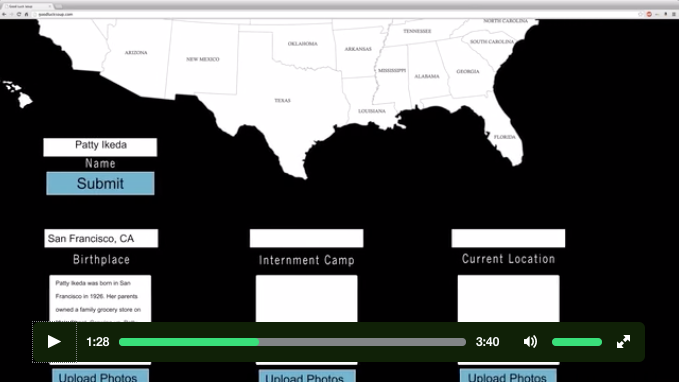Good Luck Soup is a transmedia documentary project on the journey of Japanese Americans and Japanese Canadians before, during, and after World War II.
Told through both a traditional film and an interactive documentary, the feature film tells the story of one Japanese American family, while the interactive film tells the stories of many.
Description from Project Site
I’m particularly drawn to this project for several reasons. It originates from the desire of the filmmaker, Matthew Hashiguchi, to document his family’s stories. It functions as a space for his family, and other Japanese Americans, to easily share their stories and images. And, it offers a model for supplementing and providing additional perspectives to Hashiguchi’s own telling of the story through his documentary.
For my The Farm project, I’m interested in collecting and sharing stories from people who visited, lived or worked at my family’s farm. I’m hoping to use those stories to supplement/complement my own narrative/s about the Farm. I’m always looking for models for how to do that online.
Since the full version of this site won’t launch until October 6th, I can’t write a lot about how it works online right now. But, I wanted to mention Hashiguchi’s method for collecting stories:
- Oral histories collected through “interview gathering sessions” conducted in select cities
- Online submissions
- Submissions e/mailed to Hashiguchi
I look forward to checking out the full site and how stories are submitted and displayed online. I checked out the Kickstarter video and I like how the stories will be mapped and how submitters can provide a name and stories/photos about their birthplace, internment camp and current location. Will that still be possible in the final version? I hope so.
In addition to collecting stories and photos from family/community members, Hashiguchi is also using archival footage:
The historical footage and photographs used were available, royalty free, through the National Archives. I’d say a majority of the historical footage comes from WWII propaganda films. Photographers Ansel Adams and Dorothea Lange also made much of their work from the internment camps available to the public and for educational purposes, which is certainly what we’re doing.
Matthew Hashiguchi
Is footage like this available for the UP/Amasa?

